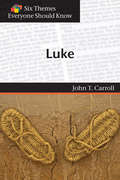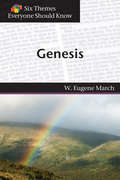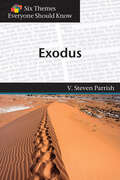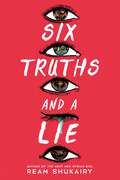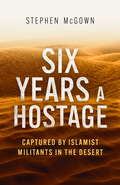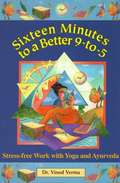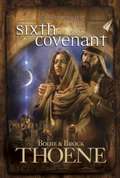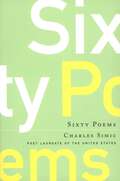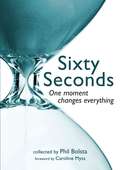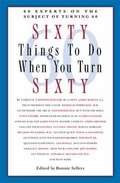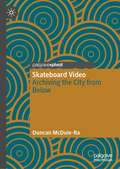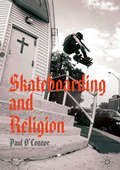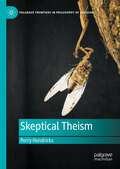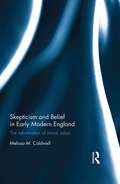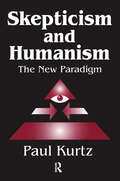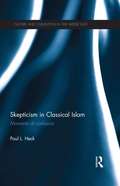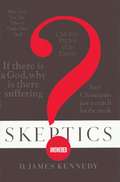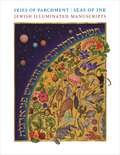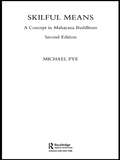- Table View
- List View
Six String Rocketeer: Holding Life Together When Your Parents Split Apart
by Jesse ButterworthThe painful, scary, but sometimes hilarious true story of how one guy survived his parents' divorce. And lived to sing about it. The teenage years are tough as it is, but throw in the fact that your parents are divorcing and it's like fuel on the fire. It started with the poorly muffled fights in his parents' bedroom. They just seemed to get worse, and it seemed that the inevitable would happen. Finally, it did and the family meeting was called. Jesse Butterworth had a hunch his folks were going to announce they were separating-but the two youngest boys were certain they'd be told they were going to Disneyland. No such luck. What happens when your world falls apart? How do you handle it when the two people you trusted most totally disappoint you...and seemingly destroy your already shaky life? That's what happened to Jesse Butterworth, and he tells his story with humor, honesty, and heart. He also shows how he figured out what to do with the emotions that come with divorce: anger, hurt, frustration, and loss. Picking up a beat up guitar, Jesse discovered that he could turn his misery into music and his pain into passion-becoming theSix String Rocketeer. In the process Jesse realized that the wounds that hurt you can become the wounds that heal you.
Six Themes Everyone Should Know: Genesis
by W. MarchThe book of Genesis points us toward our beginnings as a human race as well as the beginnings of our faith in the God who is revealed in the book. God cares and loves the creation and provides for the good of human creatures by being present with them. In this study, you will learn of God's ways in the world. We find who God is in relation to those who look to God as a good and loving creator.
Six Themes in Exodus Everyone Should Know (Six Themes Everyone Should Know)
by V. Steven ParrishThe Six Themes Everyone Should Knowseries introduces biblical books and their main themes. Each volume consists of six chapters that present major biblical themes; each chapter contains an introduction and three major sections:
Six Truths and a Lie
by Ream ShukairySix Muslim teens are falsely accused of a deadly attack in this timely and harrowing examination of America&’s justice system, perfect for fans of Angie Thomas and Samira Ahmed. As fireworks pop off at a rowdy Fourth of July bonfire party, an explosion off the California coast levels an oil rig—resulting in chaos and worse, murder. At the center are six Muslim teens - six patriots, six strangers, and six suspects. An old soul caught in the wrong place. An aspiring doctor. An influencer with a reputation to protect. A perfect daughter with secrets to hide. A soccer star headed for Stanford. An immigrant in love. Each with something to hide and everything to lose. Faced with accusations of terrorism, The Six are caught in a political game that will pit them against each other in exchange for exoneration. They must choose: frame each other to guarantee their own independence or expose their secrets to earn back freedom for them all.
Six Years a Hostage: Captured by Islamist Militants in the Desert
by Stephen McGownStephen McGown was en route from London to South Africa, on a once-in-a-lifetime trip by motorbike, returning home to Johannesburg. He had reached Timbuktu, in Mali, when he was captured, along with a Dutch and a Swedish national, by Al Qaeda Islamist militants. Steve was taken because he held a British passport. He was subsequently held hostage at various camps in the Sahara Desert in the north-west of Africa for nearly six years before eventually being released.Life as Steve had known it changed in that instant that he was taken at gunpoint. He had nothing to bargain with, and everything to lose. For the next six years, he reluctantly engaged in what he came to call the greatest chess game of his life. Thousands of kilometres to the south, in Johannesburg, the shock of Stephen's capture struck the McGown family and his wife, Cath, with whom he had, until recently, been living in London. They immediately began efforts to secure Steve's release, through diplomatic channels and in every other way they felt might have a chance of seeing Stephen freed. But as the months of captivity became years, Steve was compelled to go to extraordinary lengths to survive. Making it back home alive became his sole aim. To accomplish this, he realised that he would have to do everything he could to raise his status in the eyes of his captors. To this end, he taught himself Arabic and French, and also converted to Islam, accepting a new name, Lot. To this day, Steve retains the unenviable record of being the longest-held, surviving prisoner of Al Qaeda. While he was undoubtedly always Al Qaeda's captive, through the long years he spent in intimate proximity to his captors, Steve got to see the Islamist militants as few other Westerners have ever seen them. Six Years a Hostage is not only a remarkable story of mental strength, physical endurance and the resilience of the human spirit, but also, significantly, a unique and nuanced perspective onone of the world's most feared terrorist groups. Steve did not merely survive his terrible ordeal; he emerged from the desert a changed - stronger, more positive - human being. This is Stephen McGown's remarkable story, as told to Tudor Caradoc-Davies, a freelance writer, editor and author based in Cape Town, South Africa. After seven years spent working for glossy magazines such as Men's Health, GQ, Best Life and Women's Health, he now contributes to a range of publications. He also writes for the (South African) Sunday Times, and Red Bulletin.
Six Years a Hostage: Captured by Islamist Militants in the Desert
by Stephen McGownStephen McGown was en route from London to South Africa, on a once-in-a-lifetime trip by motorbike, returning home to Johannesburg. He had reached Timbuktu, in Mali, when he was captured, along with a Dutch and a Swedish national, by Al Qaeda Islamist militants. Steve was taken because he held a British passport. He was subsequently held hostage at various camps in the Sahara Desert in the north-west of Africa for nearly six years before eventually being released.Life as Steve had known it changed in that instant that he was taken at gunpoint. He had nothing to bargain with, and everything to lose. For the next six years, he reluctantly engaged in what he came to call the greatest chess game of his life. Thousands of kilometres to the south, in Johannesburg, the shock of Stephen's capture struck the McGown family and his wife, Cath, with whom he had, until recently, been living in London. They immediately began efforts to secure Steve's release, through diplomatic channels and in every other way they felt might have a chance of seeing Stephen freed. But as the months of captivity became years, Steve was compelled to go to extraordinary lengths to survive. Making it back home alive became his sole aim. To accomplish this, he realised that he would have to do everything he could to raise his status in the eyes of his captors. To this end, he taught himself Arabic and French, and also converted to Islam, accepting a new name, Lot. To this day, Steve retains the unenviable record of being the longest-held, surviving prisoner of Al Qaeda. While he was undoubtedly always Al Qaeda's captive, through the long years he spent in intimate proximity to his captors, Steve got to see the Islamist militants as few other Westerners have ever seen them. Six Years a Hostage is not only a remarkable story of mental strength, physical endurance and the resilience of the human spirit, but also, significantly, a unique and nuanced perspective onone of the world's most feared terrorist groups. Steve did not merely survive his terrible ordeal; he emerged from the desert a changed - stronger, more positive - human being. This is Stephen McGown's remarkable story, as told to Tudor Caradoc-Davies, a freelance writer, editor and author based in Cape Town, South Africa. After seven years spent working for glossy magazines such as Men's Health, GQ, Best Life and Women's Health, he now contributes to a range of publications. He also writes for the (South African) Sunday Times, and Red Bulletin.
Sixteen Minutes to a Better 9-to-5: Stress-free work with Yoga and Ayurveda
by Vinod VermaDr. Verma's advice for a stress-free work environment begins with a daily yoga program-easy exercises that take a total of sixteen minutes a day! She shows you how to recognize the three basic Ayurvedic types so you can "read" the people you work with. Do you have a project that requires long-term careful attention? Give it to a kapha constitution and assign the tight deadlines to the person with a vatta or pitta constitution. The pitta type tends to overreact-but do you appreciate the initiative and abundant creative energy this person offers? Can you accept the various types-including yourself? Dr. Verma describes them so you can work better as part of a team. You will also learn how to balance your type with various foods and spices. This is not a diet book-instead, Dr. Verma offers a way to balance your energy so you get the most out of yourself that you can. Basic Ayurvedic information brings a whole new approach to food, for spices and food choices can help rebalance energy when you have pushed yourself too far, as we all sometimes do. Dr. Verma is practical. She teaches in Europe and all over India-her books have been translated into many languages, and she has a wealth of experience with balancing the demands of a busy schedule and maintaining a healthy lifestyle. The 5000-year-old-system that she teaches has worked for her and countless others. Why don't you give it a try? If you are a take-charge kind of person-whether you work at home, in an office, or on a freelance basis-you'll get something from reading this book!
Sixth Covenant (A. D. Chronicles #6)
by Bodie Thoene Brock ThoeneWho in Bethlehem could guess that their tiny, obscure village, populated by shepherds, would become the hinge upon which all history turns . . . and the focus of a terrifying rampage? Sixth Covenant is the conclusion of the three-book Nativity story within the A.D. Chronicles series. Sixth Covenant chronicles Mary, Yosef, and baby Yeshua in the first months of his life in Bethlehem. From the shepherd's visit to the escape to Egypt to the Bethlehem babies who gave their life for Jesus, discover the most critical events in the history of the world.
Sixty Poems: Nineteen Sixty-three To Nineteen Eighty-three
by Charles SimicHere are sixty of Charles Simic's best known poems, collected to celebrate his appointment as the fifteenth Poet Laureate of the United States.
Sixty Seconds
by Phil BolstaSpiritual awakenings, whether quiet and subtle or dramatic and breathtaking, are deeply personal events. More than half of us have undergone a spiritual transformation, each unique and life-changing. We may only have a moment or two to act or we may have a few months to sort things out. We may curse the gods or sink to our knees in gratitude. Th e circumstances vary but two things are certain. One, our life is about to change. And two, it's a day we will not soon forget. Sixty Seconds is an uplifting collection of intimate, heartfelt stories from prominent people who graciously share their personal experiences with the profound. Their moving, life-altering interviews powerfully illustrate that sacred moments of illumination and insight are available to us all.
Sixty Things to Do When You Turn Sixty
by Ronnie SellersSixty Things To Do When You Turn Sixty is a collection of essays that speaks to the reader who has or will soon turn 60. These are essays that are practical, covering subjects like health care, fitness, finance, and business, and also essays that are more reflective, more whimsical, or more reassuring - or just plain laugh-out-loud funny. All royalties are being donated to cancer research.
Skateboard Blues
by Sydell I. VoellerJessica Williams wishes she were anywhere other than her small town in Oregon. All the kids there are the same except for the few skateboarders her father cannot stand. Life is pretty dull for Jessica until Cam Easton moves into her neighborhood. But when Cam teaches Jessica how to skate, and her father runs for mayor of Preston, her involvement with the skaters poses a threat to her father's campaign. Can the skateboarders prove themselves worthy of the community's support? And most of all, can Jessica and Cam resolve their differences and discover the true meaning of love?
Skateboard Video: Archiving the City from Below
by Duncan McDuie-RaThis book is about skateboard video and experimental ways of thinking about cities. It makes a provocative argument to consider skate video as an archive of the city from below. Here ‘below’ has a dual meaning. First, below refers to an unofficial archive, a subaltern history of urban space. Second, below refers to the angle from which skateboarders and filmers gaze upon, capture, and consume the city—from the ground up. Since taking to the streets in the early 1980s, skateboarding has been captured on film, video tape and digital memory cards, edited into consumable forms and circulated around the world. Videos are objects amenable to ethnographic analysis while also archiving exercises in urban ethnography by their creators. I advocate for taking skate video seriously as a (fragile) archive of the urban backstage, collective memory across time and space, creative urban practice, urban encounters (people-to-people and people-to-object/s), and the globalization of a subculture at once delinquent and magnificent.
Skateboarding and Religion
by Paul O'ConnorThis book explores the ways in which religion is observed, performed, and organised in skateboard culture. Drawing on scholarship from the sociology of religion and the cultural politics of lifestyle sports, this work combines ethnographic research with media analysis to argue that the rituals of skateboarding provide participants with a rich cultural canvas for emotional and spiritual engagement. Paul O’Connor contends that religious identification in skateboarding is set to increase as participants pursue ways to both control and engage meaningfully with an activity that has become an increasingly mainstream and institutionalised sport. Religion is explored through the themes of myth, celebrity, iconography, pilgrimage, evangelism, cults, and self-help.
Skeleton Keys: Workplace Hauntings
by John Klann10 true paranormal stories examining true hauntings involving professional peopleHaunted houses and buildings, hotels, homes, and more provide the backdrop for ghostly talesExperiences assembled from interviews and dramatized with storytelling techniques
Skeptical Theism (Palgrave Frontiers in Philosophy of Religion)
by Perry HendricksIs evil evidence against the existence of God? Does divine hiddenness provide an evidential problem for theism? Is our evolutionary history evidence that God doesn’t exist? Skeptical theism is the view that humans are cognitively limited in important ways that prevent us from providing affirmative answers to these evidential questions. In this book—the first monograph published on skeptical theism—Perry Hendricks gives careful, novel, and compelling arguments in favor of skeptical theism and provides a comprehensive defense of it, addressing all major objections to skeptical theism on offer. The implications of skeptical theism are teased out: it undermines the most prominent arguments for atheism on offer, which significantly lowers the epistemic status of atheism.
Skepticism and Belief in Early Modern England: The Reformation of Moral Value
by Melissa M. CaldwellThe central thesis of this book is that skepticism was instrumental to the defense of orthodox religion and the development of the identity of the Church of England. Examining the presence of skepticism in non-fiction prose literature at four transitional moments in English Protestant history during which orthodoxy was challenged and revised, Melissa Caldwell argues that a skeptical mode of thinking is embedded in the literary and rhetorical choices made by English writers who straddle the project of reform and the maintenance of orthodoxy after the Reformation in England. Far from being a radical belief simply indicative of an emerging secularism, she demonstrates the varied and complex appropriations of skeptical thought in early modern England. By examining a selection of various kinds of literature-including religious polemic, dialogue, pamphlets, sermons, and treatises-produced at key moments in early modern England’s religious history, Caldwell shows how the writers under consideration capitalized on the unscripted moral space that emerged in the wake of the Reformation. The result was a new kind of discourse--and a new form of orthodoxy--that sought both to exploit and to contain the skepticism unearthed by the Reformation.
Skepticism and Humanism: The New Paradigm
by Paul KurtzAs we begin the third millennium there is cause for cautious optimism regarding the human prospect. Democratic revolutions and the doctrine of universal human rights have captured the imagination of large sectors of humanity, while major advances in science and technology continue to conquer disease and extend life, contributing to rising standards of living, affluence, and cultural freedom on a worldwide basis. Paradoxically, at the same time ancient authoritarian fundamentalist religions have grown in vitriolic intensity along with bizarre New Age, media-driven paranormal belief systems. Also surprising is the resurgence of primitive tribal and ethnic loyalties, unleashing wars of intolerance and bitterness. In Skepticism and Humanism, Paul Kurtz locates these threatening developments within a long-standing and largely unchallenged theological worldview. He proposes, as an alternative to religion, a new cultural paradigm rooted in scientific naturalism, rationalism, and a humanistic outlook.An estimated 60 percent of scientists are atheists or agnostics. However, the skeptical world view has been given little currency even in advanced societies, because of a cultural prohibition against the criticism of religion. At the same time, science has become increasingly narrow and specialized so that few people can draw on its broader intellectual and cultural implications. Skepticism and Humanism attempts to meet this need. It defends skepticism as a method for developing reliable knowledge by using scientific inquiry and reason to test all claims to truth. It also defends scientific naturalism-an evolutionary view of nature, life, and the human species. Kurtz sees the dominant religious doctrines as drawn from an agricultural/nomadic past, and emphasizes the need for a new outlook applicable to the postindustrial information age. At the same time, he rejects postmodernism for abandoning science and embracing a form of nihilism.There can be no doubt that as a new global civilization emerges, scientific naturalism, rationalism, and secular humanism have something significant to say about the meaning of life. Skepticism and Humanism shows how they can to foster democratic values and social prosperity. The book will be important for philosophers, scientists, and all those concerned with contemporary issues.
Skepticism in Classical Islam: Moments of Confusion (Culture and Civilization in the Middle East)
by Paul L. HeckThe first major treatment of skepticism in Islam, this book explores the critical role of skeptical thinking in the development of theology in Islam. It examines the way key thinkers in classical Islam faced perplexing questions about the nature of God and his relation to the world, all the while walking a fine line between belief in God’s message as revealed in the Qur’an, and the power of the mind to discover truths on its own. Skepticism in Classical Islam reveals how doubt was actually an integral part of scholarly life at this time. Skepticism is by no means synonymous with atheism. It is, rather, the admission that one cannot convincingly demonstrate a truth claim with certainty, and Islam’s scholars, like their counterparts elsewhere, acknowledged such impasses, only to be inspired to find new ways to resolve the conundrums they faced. Whilst their conundrums were unique, their admission of the limits of knowledge shares much with other scholarly traditions. Seeking to put Islam on the map of the broader study of the history of scepticism, this book will be of interest to scholars and students of Religion, History and Philosophy.
Skeptics Answered
by D. James KennedyIn this book, D. James Kennedy takes on some of the most-asked questions regarding the validity of the Christian faith and provides factual, well-reasoned answers. In clear, unassuming language, Dr. Kennedy examines the reliability of the Bible, the nature of God, and Christian faith in the face of life's harsh realities. Skeptics Answered affirms the faith of Christians everywhere and is ideal for both personal and group study. In addition, it makes an excellent gift for any non-believer who, as a matter of intellectual integrity, is willing to consider the clear evidence for the Christian faith.
Skid (Occupational Hazards Series, Book #3)
by Rene GutteridgeBlissfully unaware that Adantica Flight 1945 from Atlanta to Amsterdam is about to make aviation history, First Officer Danny McSweeney focuses his energies on navigating the turbulent personalities of an eccentric female captain, a co-pilot with a talent for tactless comments and conspiracy theories, and a lead flight attendant with an outsized attitude that definitely exceeds the limits for carry-on baggage. On the other side of the cockpit door, the unscheduled in-flight entertainment includes a potbellied pig, a jittery diamond courier, and the recently jilted Lucy Meredith, whose personal mantra of "What Would Oprah Do?" will be challenged by the sudden appearance of her ex and his new traveling partner. On her left sits Hank Hazard, whose unusually polite but constant requests--prompted by his covert role as a spy for the airline--test the limits of the crew's customer service. But as Lucy and the rest of the crew discover, Hank's odd behavior is linked to a quiet faith that may play a key role in the fate of everyone on board. Especially when an unexpected traveler sets this already bumpy flight on a course toward the unfriendly skies.
Skid: A Novel (The Occupational Hazards #3)
by Rene GutteridgeBlissfully unaware that Atlantica Flight 1945 from Atlanta to Amsterdam is about to make aviation history, First Officer Danny McSweeney focuses his energies on navigating the turbulent personalities of an eccentric female captain, a co-pilot with a talent for tactless comments and conspiracy theories, and a lead flight attendant with an outsized attitude that definitely exceeds the limits for carry-on baggage.On the other side of the cockpit door, the unscheduled in-flight entertainment includes a potbellied pig, a jittery diamond courier, and the recently jilted Lucy Meredith, whose personal mantra of "What Would Oprah Do?" will be challenged by the sudden appearance of her ex and his new traveling partner. On her left sits Hank Hazard, whose unusually polite but constant requests-prompted by his covert role as a spy for the airline-test the limits of the crew's customer service. But as Lucy and the rest of the crew discover, Hank's odd behavior is linked to a quiet faith that may play a key role in the fate of everyone on board. Especially when an unexpected traveler sets this already bumpy flight on a course toward the unfriendly skies.From the Trade Paperback edition.
Skies of Parchment, Seas of Ink: Jewish Illuminated Manuscripts
by Raymond P. Scheindlin Eva Frojmovic Diane Wolfthal Jenna Siman Jacobs Hartley Lachter Shalom Sabar Ágnes Vető Susan Vick Barbara WolffA superbly illustrated history of five centuries of Jewish manuscriptsThe love of books in the Jewish tradition extends back over many centuries, and the ways of interpreting those books are as myriad as the traditions themselves. Skies of Parchment, Seas of Ink offers the first full survey of Jewish illuminated manuscripts, ranging from their origins in the Middle Ages to the present day. Featuring some of the most beautiful examples of Jewish art of all time—including hand-illustrated versions of the Bible, the Haggadah, the prayer book, marriage documents, and other beloved Jewish texts—the book introduces readers to the history of these manuscripts and their interpretation.Edited by Marc Michael Epstein with contributions from leading experts, this sumptuous volume features a lively and informative text, showing how Jewish aesthetic tastes and iconography overlapped with and diverged from those of Christianity, Islam, and other traditions. Featured manuscripts were commissioned by Jews and produced by Jews and non-Jews over many centuries, and represent Eastern and Western perspectives and the views of both pietistic and liberal communities across the Diaspora, including Europe, Israel, the Middle East, and Africa.Magnificently illustrated with pages from hundreds of manuscripts, many previously unpublished or rarely seen, Skies of Parchment, Seas of Ink offers surprising new perspectives on Jewish life, presenting the books of the People of the Book as never before.
Skilful Means: A Concept in Mahayana Buddhism
by Michael Pye'Skilful Means' is the key principle of Mahayana, one of the great Buddhist traditions. First described in the Lotus Sutra, it originates in myths of the Buddha's compassionate plans for raising life from the ceaseless round of birth and death. His strategies or interventions are 'skilful means' - morally wholesome tricks devised for the purpose of enabling nirvana or enlightenment. Michael Pye's clear and engaging introductory guide investigates the meaning and context of skilful means in Mayahana Buddhist teachings, whilst tracing its early origins in ancient Japanese and Theravada thought. First published in 1978, and still the best explanation of the concept, it illuminates a core working philosophy essential for any complete understanding of Buddhism.

